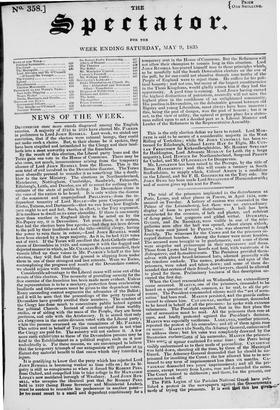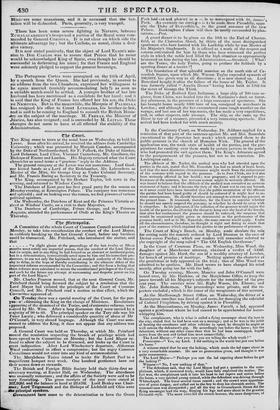The trial of the prisoners implicated in the disturbances at
Paris, Lyons, and other places in France, in April 1834, commenced on Tuesday. A battery of cannon was concealed in the Palace of the Luxembourg, but there was no extraordinary display of force to prevent disturbance. A hall has been constructed for the occasion, of lath and plaster, and redolent of damp paint, but gorgeous and gilded withal. DUCHATEL, GUIZOT, and DE BROGLIE, were visible in one of the sidegalleries soon after the ball was opened, about eleven o'clock. They were soon 'joined by PERSIL, who was observed to laugh heartily. The witnesses for the Crown and for the prisoners occupied distinct benches. Among the former were many females. The accused were brought in by gendarmerie, and some of them were singular and picturesque in their appearance and dress. Those from Lyons had long beards and hair, with waistcoats ti /a Robespierre, and faatastical coats. The Parisians provided themselves with glazed broad-brimmed hats, adorned generally with the tricolour cockade. The names, professions, and ages of the prisoners, were asked and taken down ; and some of them demanded that certain of their friends, not lawyers, should be allowed to plead for them. Preliminary business of this description occupied the first day. When the Court reassembled on Wednesday, an extraordinary scene occurred. MARTIN, one of the prisoners, demanded to be heard on a question of right, common, as he said, to all the prisoners. The President commanded silence until the "act of accusation" had been read. MARTIN persisted, and the guards endeavoured to silence him. CAVAIGNAC, another prisoner, demanded to be heard in behalf of all the prisoners: he spoke with extreme vehemence. The President repeated, that in the first place the act of accusation must ba read. All the prisoners then rose at once, and loudly protested against the President's decision. MARTIN was especially vociferous. LAGRANGg; another prisoner, repeated the protest of his comrades; and all of them again rose en muse. MARTIN (du Nord), the Attorney-General, endeavoured' to address them ; but hit veto was completely drowned by the Stentorian e.:tclanr.lions of his namesake, MARTIN the prisoner. This seell;; of uproar continued for some time ; the Peers being visibly embarrassed as to their mode of proceeding. CAVAIGNAC was held down, shouting all the time, by three of the Municipal Guard. The Attorney-General demanded that he should be imprisoned for insulting the Court : the law allowed him to be sentenced to any term of imprisonment less than six months. CAVAIGNAC demanded two years' imprisonment; and all the prisoners, except twenty from Lyons, rose and demanded the same. The Court retired to deliberate ; and there, for the present, our accounts break off. The Fifth Legion of the Parisian National Guard have published a protest in the newspapers against the Govemment'4 mode of trying the prisoners, It is said that this IPA ging,—
blinisiers some uneasiness, and it is surmised that the battalion will be disbanded. Paris, generally, is very tranquil.



























